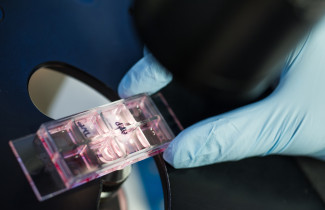The recent experience of the COVID-19 pandemic and the ensuing vaccine development have drawn our attention to the system that keeps us alive: immunity. However, our immune system does more than fight against microbes. The new textbook Molecular Immunology: How Science Works by Professor Carsten Carlberg and Dr Eunike Velleuer provides an essential background in molecular immunology. This includes the basic principles and underlying processes of immunity against bacteria and viruses, immune responses to cell and organ transplants, the overboarding immune activation in allergies and autoimmune reactions, as well as the way how a properly functioning immune system protects us against cancer.
“Understanding these mechanisms will highlight that a fight against viruses uses the same mechanisms as the battle against thousands of transformed cancer cells arising every day in each of us,” the authors remark.
Our immune system is composed of biological structures like the lymphatic system and bone marrow, as well as cellular immunity mediated by cell types such as leukocytes and humoral immunity mediated by proteins such as antibodies and complement proteins. The perfect balance of these components protects us against infectious diseases and cancer. Molecular immunology aims to understand the collective and coordinated response of these cells and proteins to substances that are foreign to our body. The main purpose of this immune response is the fight against microbes, such as viruses, bacteria, fungi and parasites. However, the example of allergic reactions, which nowadays are getting continuously more common, demonstrates that also non-microbial molecules can induce a strong reaction of our immune system. Moreover, incorrect reactions of the immune system can lead to autoimmune diseases, such as type I diabetes and multiple sclerosis. Immune responses can cause tissue injuries that are more harmful than the effects of pathogenic microbes. These collateral damages may be even fatal, such as in the case of bacterial sepsis or strong responses to SARS-CoV-2 infections.
The different chapters of the book explain the cellular basis of immunology, the key molecules mediating the effector functions of B and T cells, and how molecular immunology is associated with infections caused by bacteria and viruses, organ transplantation, allergy and autoimmunity as well as different types of cancers.
“We hope that readers will enjoy this rather visual book and get as enthusiastic as the authors about life and its protection reflected in the fine-tuned molecular immunology.”
Molecular Immunology: How Science Works is the fifth textbook in the series How Science Works co-authored by Professor Carlberg. The earlier books in the undergraduate book series are Cancer Biology: How Science Works, Mechanisms of Gene Regulation: How Science Works, Human Epigenetics: How Science Works and Nutrigenomics: How Science Works. They are linked to the lecture courses in Molecular Immunology, Molecular Medicine and Genetics, Cancer Biology and Nutrigenomics given by Professor Carlberg at the University of Eastern Finland in Kuopio. The book series now covers each lecture course.
Carsten Carlberg graduated in 1989 with a PhD in biochemistry at the Free University Berlin. After positions as postdoc at Roche in Basel, group leader at the University of Geneva and docent at the University of Düsseldorf, he is since 2000 full professor of biochemistry at the University of Eastern Finland in Kuopio. His work focuses on the mechanisms of gene regulation by nuclear hormones, in particular on vitamin D. At present, Professor Carlberg’s projects focus on the epigenome-wide effects of vitamin D on the human immune system in the context of cancer.
Eunike Velleuer graduated in 2006 as MD at the University of Düsseldorf and specialized in 2016 in pediatric hemato-oncology. At present, she serves as senior physician at the Helios Children’s Clinic Krefeld as well as a research associate at the University of Düsseldorf. Her special clinical focus is the cancer predisposition syndrome Fanconi anemia. Herein, her research interest is early detection and prevention of oral squamous cell carcinoma and identifying patients with Fanconi anemia at risk. Furthermore, Dr. Velleuer is interested in increasing patients’ resilience and finding alternative ways for long-lasting empowerment.
For further information, please contact:
Professor Carsten Carlberg, carsten.carlberg (a) uef.fi, +358 403553062
Carlberg, Carsten and Velleuer, Eunike. Molecular Immunology: How Science Works. Springer International Publishing, 2022. https://link.springer.com/book/10.1007/978-3-031-04025-2



